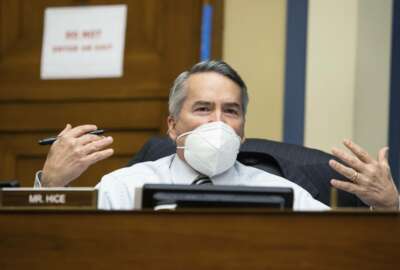Shift in Congressional majority could drive Democrats’ oversight agenda
People who track politics say the majority in Congress could switch next year from Democratic to Republican. If that's the case, that prospect will drive the...
Best listening experience is on Chrome, Firefox or Safari. Subscribe to Federal Drive’s daily audio interviews on Apple Podcasts or PodcastOne.
People who track politics say the majority in Congress could switch next year from Democratic to Republican. If that’s the case, that prospect will drive the Democrats’ oversight agenda for the rest of 2022. Some congressional leaders have laid out their agendas on paper. For what agencies can expect, the Federal Drive with Tom Temin turned to Hogan Lovells attorney and former House Foreign Affairs Committee staff member Ari Fridman.
Interview transcript:
Tom Temin: People who track politics say the majority in Congress could switch next year from Democratic to Republican. If that’s the case, that prospect will drive the Democrats’ oversight agenda for the rest of 2022. Some congressional leaders have laid out their agendas on paper. And for what agencies might be able to expect. We turn to Hogan Lovells attorney and former House Foreign Affairs Committee staff member Ari Friedman. Mr. Friedman, good to have you on.
Ari Fridman: Thanks for having me, Tom.
Tom Temin: And having been on the Hill, then you know that the possible political outcome does drive the agenda up there. So if the Democrats do think that they might be in the minority starting in 2023, what will happen oversight wise in the coming year?
Ari Fridman: Tom, what my colleague, Aaron Cutler, and I have hypothesized is that, particularly on the House side, that Democrats are very likely to intensify a number of their existing investigations. If you take a look at a panel, like the Select Subcommittee on the Coronavirus Crisis. They’ve talked about the investigations that they intend to continue over the next six months or so. And I think the way to think about it is reverse engineer sort of the next six months from the August recess backwards. The August recess is likely to be the endpoint could even be well before that in which essentially Congress gets anything done. By that time, they’ll have to have their messaging done in advance of the 2022 midterm elections. And so if you take a look at the Select Subcommittee on the Coronavirus Crisis, they’ve talked about investigations into Coronavirus infections and deaths, let’s say in meatpacking plants, or the review of certain government contracts to manufacture vaccines and therapeutics that have been plagued by production errors and instances of contamination. So it’s those kinds of investigations that we think will intensify.
Tom Temin: There’s a theme there, though, that they’re looking at some of the external entities such as those that might be bargaining unit employees at the meatpacking plants, or for those that are contractors that sometimes are thought to maybe take advantage of the situation. And I’m making the distinction between the oversight of federal agency response, for example.
Ari Fridman: That’s right. I mean, I think within the oversight community, there’s typically a truism, which, you know, I have found to be more or less true that Democrats are particularly focused on the private sector and Republicans are focused on the agencies doesn’t always line up that neatly, and certainly during the pandemic, that there can be a little in both columns, but that’s what we see for the moment.
Tom Temin: But we should say one of the items you cited that could continue as an investigation this year would be the administration of the economic injury disaster loan program, and what you’re calling the adequacy of fraud controls within that program. So that’s a federal program that people are looking at. And really, if you look at this, in the larger sense, there hasn’t been much of an accounting of how well or how badly all of that money was spent. Since going back to 2020.
Ari Fridman: That’s a really good point, Tom, it’s kind of hard to focus the American public’s attention on the enormous amounts of money that are spent when you don’t necessarily have a poster child. If you look at some of the more, I don’t know if successful is the best term but controversial investigations that have garnered a lot of public attention. Usually, it’s because a congressional committee is able to put a spotlight on a particular individual or a particular company. But when you’re talking about the amount of money that’s been spent during the pandemic, there’s so much money, and there may well be multiple instances of the kind of fraud that this select Subcommittee on the Coronavirus Crisis is talking about, but they’ve sort of yet to really pinpoint a particular actor or company that they could hold up as emblematic of a broader problem.
Tom Temin: In other words, they haven’t found a bake shop in Philadelphia that the owner of which bought a Rolls-Royce after all of the pandemic relief.
Ari Fridman: That’s right.
Tom Temin: We’re speaking with Ari Friedman, the former staff member of the House Committee on Foreign Affairs now with the law firm Hogan Lovells. In the meantime, what might the Republican side do if they’re in the minority now and feeling they could be in the majority? What’s the reverse of the situation?
Ari Fridman: Tom, so the Republicans have been fairly clear, both in terms of their rhetoric and in terms of what the media has been picking up that they intend to, and I can’t say that this is a new approach, I think it’s really more of the same, but Republicans intend to focus on what I would put in shorthand as the culture wars. So Leader McCarthy, who is the favorite to become speaker in the event that Republicans do take control of the House come next Congress. Leader McCarthy is reportedly considering an oversight agenda that involves the NSA’s alleged surveillance of Tucker Carlson, public schools use of critical race theory, illegal immigration across the southern border, the origins of the coronavirus, the list goes on so you know the Republican approach is what you may see on Fox News or OAN. There’s not a lot of nuance there. It’s a very kind of direct, concise messaging that clearly is producing results.
Tom Temin: And what about the idea of, say, federal agencies involved indirectly in pandemic work? I mean, the CDC has gotten a critique, I guess you could say, because the messaging can be confusing about what people are supposed to do or not supposed to do with respect to masking and so on. And I think it’s because the situation keeps changing. And nobody knows precisely at any given point, what is really true about all of this? So would you expect it if the Republicans take over that those who are appointed by the Biden administration in charge of some of those agencies could feel a little bit more heat?
Ari Fridman: Without question. I think the issue you’ve picked up here, Tom, about you know, how the CDC is communicating public health advice. I think, frankly, on both sides of the aisle, there’s concern about, as you say, confusing messaging and a lack of clarity for people who are trying to live their daily lives, many of whom don’t have the luxury of working from home offices and are trying to keep themselves and their families safe. And so yes, I think there’s a strong likelihood that Republicans will, throughout this year focus on how the CDC is explaining to the American people how to best protect themselves.
Tom Temin: And sometimes the high level and high visibility investigations and hearing series that are put on by whatever party is in power at the moment, does the minority party, whichever one it is, at the moment, have any power or any capability of slowing those things down, putting a little governor on the motor of those things?
Ari Fridman: It’s a good question. There are kind of delaying tactics that can be used, but in general, and each committee is a little bit different. But in general, the party in the majority wield subpoena power. And there may, let’s say, be a consultation requirement for the chairman of a committee to have to consult with the ranking member before issuing a subpoena. But basically, one of the reasons that members of Congress are interested in not just being in the majority, but wielding the gavel is that the allocation of power really is lopsided. And so for the most part, if the majority party decides that they want to issue a subpoena, or interview a particular witness, there isn’t very much that the minority party can do to stop them. Certainly, we’ve seen instances over the last couple of years where the Republican minority in the house has tried to work with various industries in warning them that they don’t trust the Democratic majority’s intentions in a particular investigation, and therefore, the Republican minority is kind of putting industry I noticed that they should be careful about cooperating with the Democratic majority. That being said, it really is the power in the majority that has the ability to dictate terms.
Tom Temin: So in other words, if one party has 5% more seats in the House, we’re talking about or more the Senate, they get 85% of the power.
Ari Fridman: That’s one way of thinking about it. If you kind of follow the money in this case, things are particularly unbalanced in the House. Typically, for the House majority, the budgets are allocated in a two-thirds to one-third ratio. And so you can imagine that has impact of course, for staff and resources that are devoted to particular investigations. In the Senate, there’s a more even distribution of resources, even when the majority may be somewhat lopsided towards one side. But that’s really why you see in the House such a scramble to wield the gavel, and conversely, why you see so many early retirements with Democrats anticipating that Republicans will take the majority in 2023.
Tom Temin: So if Mr. McCarthy finds an envelope in the speaker’s desk from Mrs. Pelosi, and he opens it, it’s likely to say, I’ll be back.
Ari Fridman: That’s right. Of course, this is all cyclical, and quite possible.
Tom Temin: All right. Ari Fridman is a former staff member of the House Committee on Foreign Affairs, now with the law firm Hogan Lovells. Thanks so much for joining me.
Ari Fridman: Thanks for having me, Tom.
Copyright © 2025 Federal News Network. All rights reserved. This website is not intended for users located within the European Economic Area.
Tom Temin is host of the Federal Drive and has been providing insight on federal technology and management issues for more than 30 years.
Follow @tteminWFED





